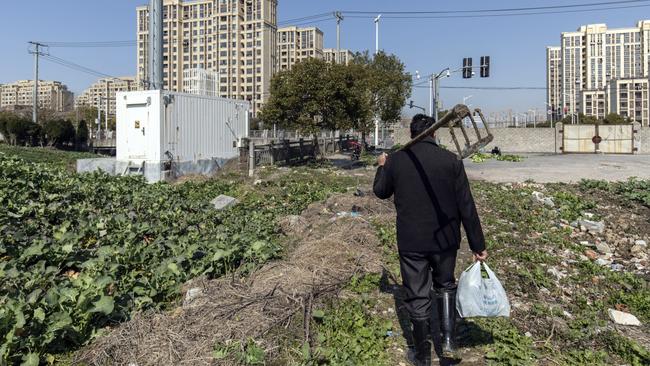Trust in Chinese high-yield bonds is broken
Many investors have come to the conclusion that trust is broken in the $272bn market for high-yield bonds of Chinese companies after a series of defaults.

After more than 10 US-dollar-debt defaults by property developers over the past year, many investors have come to the conclusion that trust is broken in the $US200bn ($272bn) market for high-yield bonds of Chinese companies.
Since last year, when the financial troubles of China Evergrande sparked a sell-off in the giant property company’s bonds and those of its peers, the market has remained deeply distressed, with no end in sight to the malaise.
A string of easing measures from Chinese authorities, local governments and banks to support the housing market and help developers access funding onshore have so far done little to change the mood in the market.
China’s top 100 developers’ monthly contracted sales volume fell for the eighth straight month in February, plunging 47 per cent from a year earlier, figures from Chinese data provider CRIC showed.
For much of the past five months, the average yield on Chinese developers’ “dollar bonds” (a bond issued outside the US that is denominated in US dollars) has been above 20 per cent, making it too expensive for most companies to raise fresh funds to pay off maturing debt.
To complicate matters, several developers that earlier claimed to have ample liquidity to repay their debts surprised investors by reneging on their statements without warning, damaging bondholders’ fragile confidence in the transparency and truthfulness of company disclosures.
“Trust takes time to build but takes just one step to destroy,” said Freddy Wong, head of the Asia-Pacific region for Invesco’s fixed-income business. Investors were willing to lend to developers that deliver on their promises, but once that trust was broken, it would be “almost impossible” to mend, he said. Since the beginning of 2021, Chinese developers have defaulted on $US8.8bn of offshore dollar bonds and the equivalent of $US5.1bn of onshore yuan-denominated bonds, dwarfing the total amount of defaulted bonds in previous years, according to Fitch Ratings.
The latest negative surprise came from a small Chinese developer called Zhenro Properties. Foreign investors were caught off guard last month when the Shanghai-based company U-turned on a promise – laid out in a Hong Kong stock-exchange filing – to redeem a $US200m perpetual bond on March 5. Zhenro also assured investors that it had the equivalent of a $US1.4bn credit line from Bank of China, a large state-owned lender.
All seemed well until speculation bubbled on February 11 that Zhenro wasn’t going to redeem the bond as planned. Amid a deep sell-off in its shares and dollar bonds, the firm dismissed the rumour as “untrue and fictitious” via another exchange filing. Days later, Zhenro asked investors for consent to delay the redemption by a year. Its perpetual bonds were recently bid at 22 per cent of their face value, versus more than 92 per cent on February 9, according to Tradeweb data.
Some investors have compared Zhenro’s sudden shift last week with an October 2021 incident when Chinese luxury developer Fantasia defaulted on a dollar bond shortly after a company representative told some bondholders that it planned to repay the debt.
Two weeks before the default, Fantasia had also said in a filing that it had “no liquidity issue”. That bond’s price, which had been 99c on the dollar a day before its maturity date, immediately plunged to around 22c and sparked a sell-off in property bonds.
Several other developers also backtracked on plans to redeem their bonds in recent months. Before Evergrande entered into a downward spiral last year, the property giant had also repeatedly stated that its operations were normal and that it had never missed an interest or principal payment on its dollar bonds. It skipped interest payments in September and defaulted on some offshore debt in December.
Investors had now adopted a “sell first and think later” mentality and were extremely sensitive to rumours, said Iris Chen, a credit analyst at Nomura. The thinking is that even what companies say in regulatory filings doesn’t ensure that the firms will stick to their pledges.
The other big problem is off-balance-sheet liabilities that several developers didn’t disclose to investors or credit rating agencies. The hidden debt has included guarantees on wealth-management products or private loans.
The troubles at Shimao show how rapidly a company’s liquidity situation can change. Late last year, S&P Global Ratings and Fitch downgraded Shimao to speculative grade. Further cuts followed, as the bond market’s dislocation increased the company’s refinancing risk. Then in January, investors became unnerved by media reports. Despite Shimao’s efforts to dispel concerns, its dollar bonds have tumbled to below 30c on the dollar.
The Wall Street Journal



To join the conversation, please log in. Don't have an account? Register
Join the conversation, you are commenting as Logout